

Charles Loeb: The Black Reporter Who Exposed an Atomic Bomb Lie. “Loeb Reflects On Atomic Bombed Area,” read the headline in The Atlanta Daily World of Oct. 5, 1945, two months after Hiroshima’s ruin.
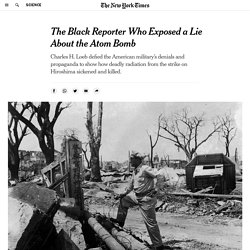
In the world of Black newspapers, that name alone was enough to attract readers. Charles H. Loeb was a Black war correspondent whose articles in World War II were distributed to papers across the United States by the National Negro Publishers Association. In the article, Mr. Loeb told how bursts of deadly radiation had sickened and killed the city’s residents. Lewis Hine. Lewis Wickes Hine (September 26, 1874 – November 3, 1940) was an American sociologist and photographer.
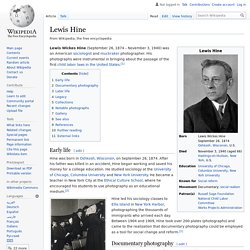
Hine used his camera as a tool for social reform. His photographs were instrumental in changing child labor laws in the United States.[1] Ida B. Wells and the Lynching of Black Women. Researchers Against the War Machine: The Story of NARMIC – Eyes on the Ties. It was 1969, and the American War on Vietnam seemed unending.
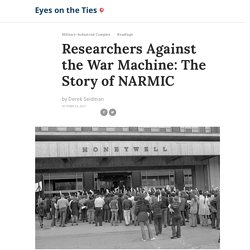
Mass outrage over the war had spilled into the nation’s streets and campuses — outrage over the rising heap of body bags returning home, over the never-ending spree of bombs that barrelled down from US planes onto rural villages, with the images of fleeing families, their skin seared by napalm, broadcast across the world. Hundreds of thousands of people had begun to resist the war. Glenn Greenwald. Glenn Greenwald (born March 6, 1967) is an American political journalist, lawyer, columnist, blogger, and author.
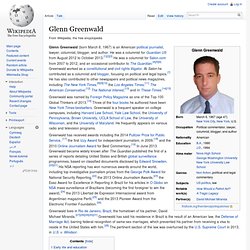
He was a columnist for Guardian US from August 2012 to October 2013.[1][2][3] He was a columnist for Salon.com from 2007 to 2012, and an occasional contributor to The Guardian.[4][5][6] Greenwald worked as a constitutional and civil rights litigator. At Salon he contributed as a columnist and blogger, focusing on political and legal topics.[7] He has also contributed to other newspapers and political news magazines, including The New York Times,[8][9][10] the Los Angeles Times,[11] The American Conservative,[12] The National Interest,[13] and In These Times.[14][15] Early life and education[edit] Career[edit] Litigation attorney[edit]
Gary Webb. Webb's reporting generated fierce controversy, and the San Jose Mercury News backed away from the story, effectively ending Webb's career as a mainstream-media journalist.
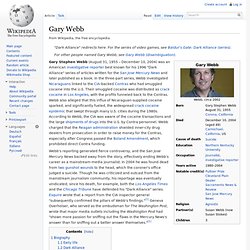
In 2004 he was found dead from two gunshot wounds to the head, which the coroner's office judged a suicide. Though he was criticized and outcast from the mainstream journalism community, his reportage was eventually vindicated; since his death, for example, both the Los Angeles Times and the Chicago Tribune have defended his "Dark Alliance" series. Esquire wrote that a report from the CIA inspector general "subsequently confirmed the pillars of Webb's findings. "[1] Geneva Overholser, who served as the ombudsman for The Washington Post, wrote that major media outlets including the Washington Post had "shown more passion for sniffing out the flaws in the Mercury News's answer than for sniffing out a better answer themselves. E. D. Morel.
Background[edit] Morel was born in the Avenue d'Eylau, Paris.
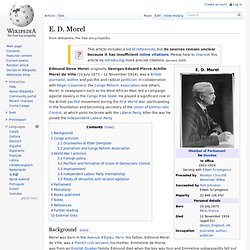
His father, Edmond Morel de Ville, was a French civil servant; his mother, Emmeline de Horne, was from an English Quaker family. Edmond died when the boy was four and Emmeline subsequently fell out with her late husband's family. As a consequence, Emmeline changed her name to Deville and raised her son on her own. To remove her son from the family's influence, she worked as a teacher so that she could send him to boarding school at both Madras House school in Eastbourne and later at Bedford Modern School. George Seldes. George Seldes (/ˈsɛldəs/ SEL-dəs;[aa][1] November 16, 1890 — July 2, 1995) was an American investigative journalist and media critic.
Seymour Hersh. Ida M. Tarbell. Ida Minerva Tarbell (November 5, 1857 – January 6, 1944) was an American teacher, author and journalist.
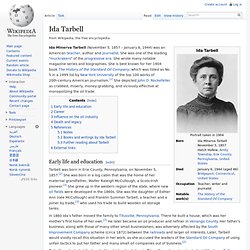
She was one of the leading "muckrakers" of the progressive era. She wrote many notable magazine series and biographies. She is best known for her 1904 book The History of the Standard Oil Company, which was listed as No. 5 in a 1999 list by New York University of the top 100 works of 20th-century American journalism.[1] She depicted John D. Lincoln Steffens. Steffens in 1914 Lincoln Steffens (April 6, 1866 – August 9, 1936) was a New York reporter who launched a series of articles in McClure's that would later be published together in a book titled The Shame of the Cities.
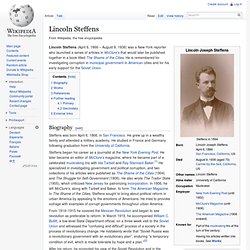
He is remembered for investigating corruption in municipal government in American cities and for his early support for the Soviet Union. Biography[edit] Steffens was born April 6, 1866, in San Francisco. He grew up in a wealthy family and attended a military academy. From 1914–1915 he covered the Mexican Revolution and began to see revolution as preferable to reform. Upton Sinclair. Early life and education[edit] Sinclair was born in Baltimore, Maryland to Upton Beall Sinclair and Priscilla Harden.
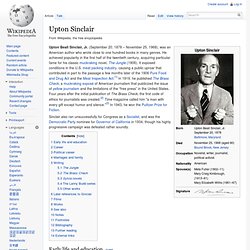
His father was a liquor salesman whose alcoholism shadowed his son's childhood. Priscilla Harden Sinclair was a strict Episcopalian who disliked alcohol, tea, and coffee. Sinclair did not get along with her when he became older because of her strict rules and refusal to allow him independence. Sinclair told his son David that around his sixteenth year he decided not to have anything to do with her and stayed away from her for 35 years because a controversy would start if they met.[4] Her lineage was of great affluence. The Official Website of I.F. Stone.